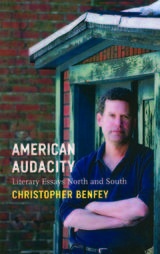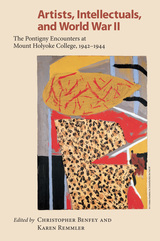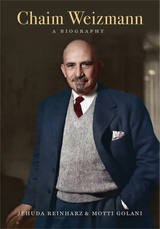2 books by Benfey, Christopher

American Audacity
Literary Essays North and South
Christopher Benfey
University of Michigan Press, 2010
One of the foremost critics in contemporary American letters, Christopher Benfey has long been known for his brilliant and incisive essays. Appearing in such publications as the New York Review of Books, the New Republic, and the Times Literary Supplement, Benfey's writings have helped us reimagine the American literary canon. In American Audacity, Benfey gathers his finest writings on eminent American authors (including Emerson, Dickinson, Whitman, Millay, Faulkner, Frost, and Welty), bringing to his subjects---as the New York Times Book Review has said of his earlier work---"a scholar's thoroughness, a critic's astuteness and a storyteller's sense of drama."
Although Benfey's interests range from art to literature to social history, this collection focuses on particular American writers and the various ways in which an American identity and culture inform their work. Broken into three sections, "Northerners,""Southerners," and "The Union Reconsidered," American Audacity explores a variety of canonical works, old (Emerson, Dickinson, Millay, Whitman), modern (Faulkner, Dos Passos), and more contemporary (Gary Snyder, E. L. Doctorow).
Christopher Benfey is the author of numerous highly regarded books, including Emily Dickinson: Lives of a Poet; The Double Life of Stephen Crane; Degas in New Orleans: Encounters in the Creole World of Kate Chopin and George Washington Cable; and, most recently, The Great Wave: Gilded Age Misfits, Japanese Eccentrics, and the Opening of Old Japan. Benfey's poems have appeared in the Paris Review, Pequod, and Ploughshares. He has held fellowships from the Guggenheim Foundation, the National Endowment for the Humanities, and the American Council of Learned Societies. Currently he is Mellon Professor of English at Mount Holyoke College.
"In its vigorous and original criticism of American writers, Christopher Benfey's American Audacity displays its own audacities on every page."
---William H. Pritchard
---William H. Pritchard
[more]

Artists, Intellectuals, and World War II
The Pontigny Encounters at Mount Holyoke College, 1942-1944
Christopher E. G. Benfey
University of Massachusetts Press, 2006
Sixty years ago, at the height of World War II, an extraordinary series of gatherings took place at Mount Holyoke College in western Massachusetts. During the summers of 1942–1944, leading Europeanï¬gures in the arts and sciences met at the college with their American counterparts for urgent conversations about the future of human civilization in a precarious world.
Two Sorbonne professors, the distinguished medievalist Gustave Cohen and the existentialist philosopher Jean Wahl, organized these "Pontigny" sessions, named after an abbey in Burgundy where similar symposia had been held in the decades before the war. Among the participants—many of whom were Jewish or had Jewish backgrounds—were the philosophers Hannah Arendt and Rachel Bespaloff, the poets Marianne Moore and Wallace Stevens, the anthropologist Claude Lévi-Strauss and the linguist Roman Jakobson, and the painters Marc Chagall and Robert Motherwell.
In this collection of original essays, Stanley Cavell and Jacques Derrida lead an international group of scholars—including Jed Perl, Mary Ann Caws, Jeffrey Mehlman, and Elisabeth Young-Bruehl—in assessing the lasting impact and contemporary signiï¬cance of Pontigny-en- Amérique. Rachel Bespaloff, a tragicï¬gure who wrote a major work on the Iliad, is restored to her rightful place beside Arendt and Simone Weil. Anyone interested in the "intellectual resistance" of Francophone intellectuals and artists, and the inspiring support from such Americanï¬gures as Stevens and Moore, will want to read this pioneering work of scholarship and historical re-creation.
Two Sorbonne professors, the distinguished medievalist Gustave Cohen and the existentialist philosopher Jean Wahl, organized these "Pontigny" sessions, named after an abbey in Burgundy where similar symposia had been held in the decades before the war. Among the participants—many of whom were Jewish or had Jewish backgrounds—were the philosophers Hannah Arendt and Rachel Bespaloff, the poets Marianne Moore and Wallace Stevens, the anthropologist Claude Lévi-Strauss and the linguist Roman Jakobson, and the painters Marc Chagall and Robert Motherwell.
In this collection of original essays, Stanley Cavell and Jacques Derrida lead an international group of scholars—including Jed Perl, Mary Ann Caws, Jeffrey Mehlman, and Elisabeth Young-Bruehl—in assessing the lasting impact and contemporary signiï¬cance of Pontigny-en- Amérique. Rachel Bespaloff, a tragicï¬gure who wrote a major work on the Iliad, is restored to her rightful place beside Arendt and Simone Weil. Anyone interested in the "intellectual resistance" of Francophone intellectuals and artists, and the inspiring support from such Americanï¬gures as Stevens and Moore, will want to read this pioneering work of scholarship and historical re-creation.
[more]
READERS
Browse our collection.
PUBLISHERS
See BiblioVault's publisher services.
STUDENT SERVICES
Files for college accessibility offices.
UChicago Accessibility Resources
home | accessibility | search | about | contact us
BiblioVault ® 2001 - 2024
The University of Chicago Press









